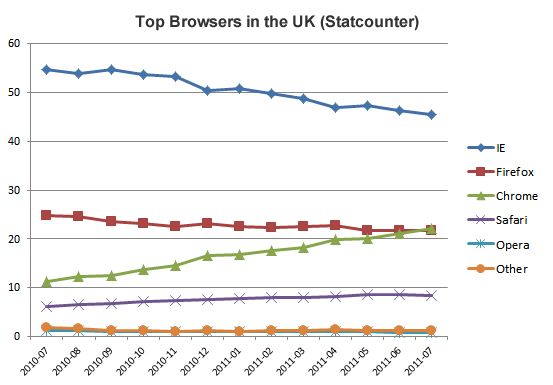When Firefox became the alternative of choice to Internet Explorer, I'm sure its developers never imagined they were opening the door for a third party to take over in a fraction of the time it took them to transform the browser market, it was a harsh first few years after all. When you consider other companies like Opera tried for years but never captured the mass following they probably deserved, it's an overwhelmingly impressive feat for Google and its Chrome browser.
Monitoring data from web metrics firm Statcounter show that Chrome overtook Firefox as the second most popular browser in the UK with 22% of the overall pie. It was marginal win, but a win nonetheless. Firefox still captured ~21.6% of the market but it's on a downward trend from the 25% share it had a year ago (Chrome grew from 11% over that same period).
Internet Explorer remains the most popular browser in the United Kingdom with 45% usage, though like Firefox it's way down from the 55% high it enjoyed just a year ago. Safari is the 4th most used web browser in that country with a 8.5% market share.

The Guardian reports that Chrome is the first product that Google has advertised nationwide on British television.
Exactly a month ago we reported on several metrics for worldwide browser usage where we observed Chrome was still ways off from reaching the second spot with a 13% market share, versus 21% of Firefox, and a very dominant 53% position from Internet Explorer. On the other hand, TechSpot readers who are undoubtedly ahead of the curve predominantly use Firefox and Chrome browsers (61% combined) versus 30% for Internet Explorer users. This in spite of the fact Internet Explorer 9 is not a bad browser, regardless of what others have to say about it.
To share one last interesting figure about browser usage, Firefox controls the browser market in Germany with 6 out of every 10 users running it.